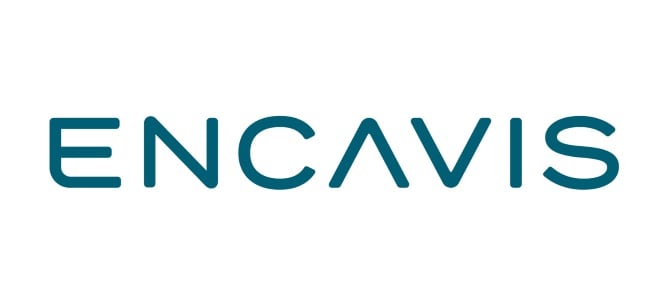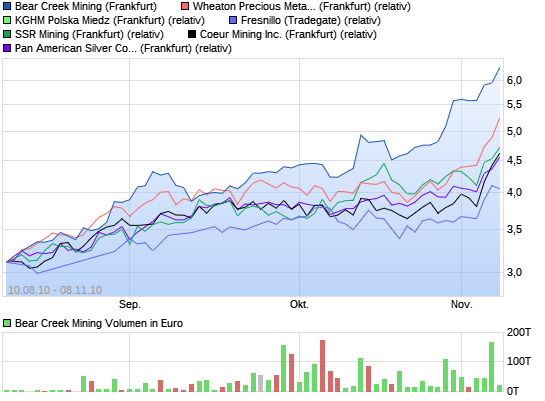06.12.2010 16:10
BEAR CREEK ANNOUNCES POSITIVE RESULTS FROM PHASE I DRILLING, TASSA SILVER-GOLD PROJECT, PERU
VANCOUVER, Dec. 6 /PRNewswire/ -- Bear Creek Mining (TSX Venture: BCM / BVL: BCM) ("Bear Creek" or the "Company") is pleased to announce results for the fifteen (15) diamond drill holes (3677.4 meters) from its Phase I drill program. The positive initial results in conjunction with ongoing mapping and sampling on the property will be evaluated to determine the scope of Phase II drilling expected to start after the rainy season in Q2 2011. Tassa is located approximately 160 kilometers northwest and 230 kilometers south of the Company's Santa Ana and Corani silver deposits respectively. Santa Ana is on the permitting track following completion of a positive feasibility study and a feasibility study at Corani is expected in late 2011. Highlights of this news release are:
-- Drill hole T-4 returns 60 meters averaging 224.2 g/t Ag from 24 to 84 meters depth -- Drill hole T-2 returns 40 meters averaging 110.70 g/t Ag from 2 to 42 meters depth -- Drill hole T-6 returns 10 meters averaging 202 g/t Ag from 168 to 178 meters depth -- Drill hole T-11 returns 12 meters averaging 146.5 g/t Ag from 16 to 28 meters depth -- The wide space initial drilling only partially tests the large, mineralized diatreme breccia complex which measures 1.5 km by 800 meters -- Every drill hole to date has encountered elevated silver with occasional gold values up to 1.24 g/t over two-meters and various intervals with >0.1 g/t Au -- Numerous untested geochemical targets remain within the diatreme complex and sedimentary host rocks adjacent to the complex which are now being targeted by geologic mapping
Andrew Swarthout, President and CEO of Bear Creek, states "We are encouraged with the success rate including four drill holes containing significant silver mineralization in our first round of widely spaced drilling in this very large target area. These positive early stage results along with multi-phase nature of the volcanic diatreme complex at Tassa as well as the presence of similar host sediments to the nearby Chucapaca gold discovery of Goldfields and Buenaventura provide significant potential to discover additional higher grade silver and gold zones within the largely untested property position and highly metal-endowed geologic environment."
The Company's 100% controlled Tassa silver-gold prospect is located approximately 16 kms north-west from Chucapaca, currently under exploration by the Goldfields - Buenaventura joint venture where ,in a very similar geologic and geochemical setting, reported resources are 83.7 MT averaging 1.9 g/t Au and 8.2 g/t Ag.. Reportedly, the higher-grade gold mineralization at Chucapaca was "blind" and drilling initially returned silver-rich intercepts before the gold deposits were discovered.
The target at Tassa is a 1.5 km by 800 meters silver/gold anomaly where 852 rock chip samples (including trenches) to date average 30.71 g/t silver. An Induced Polarization survey defined several high chargeability anomalies, which seems to be related to increased fine black sulfides which contain elevated levels of silver and gold. To date, Phase I drilling has intersected mineralization contained within multiple phases of phreatic, hydrothermal, tectonic and phreatomagmatic breccias, strongly fractured rhyolitic volcanics, and brecciated sediments.
Phase II drilling, expected to commence in Q2, 2011, will consider testing deeper in the system where favorable sedimentary formations hosting the Chucapaca mineralization are believed to exist, the borders of the diatremes in contact with sediments, and new targets generated by mapping and soil and rock geochemical sampling over the northernmost three kms of the concessions where the mineralization may be open beneath outcropping Yura quartzite.
Mineragraphic and Mineral Liberation Analysis (MLA) work establishes the main silver mineral as argentite associated with multiple mineralizing events. Seven recent bottle roll tests performed at ALS Chemex labs for cyanide extraction show Ag- Au recoveries above 70% where copper content is low; however, when copper exceeds 0.2% Cu (approximately 10% of the samples tested), recoveries tend to be lower. Earlier bottle roll tests on six samples resulted in recoveries of up to 85% silver and 95% gold (see News Release dated 7 January 2010). The high cyanide recoveries of silver and gold allow consideration of low-cost open pit mining and heap or vat leach recovery; however, the focus of the current program is to expand the higher-grade intercepts, discover higher gold to silver ratio mineralization, and develop additional targets within the district. To view maps and sections directly please click on: http://bearcreekmining.com/i/pdf/Tassa-Maps-Sections-Dec6-2010.pdf
Other News:
In other exploration news, four drill holes totaling 694 meters were completed at the Campanario project. Although numerous intervals of anomalous gold values were encountered, the results indicate that a bulk tonnage deposit is very unlikely. The Company's option agreement is being terminated and no further work is planned.
Consistent with the Company's aggressive generative exploration philosophy, several additional prospects in the portfolio are being evaluated for future drilling or acquisition.
The TSX Venture Exchange does not accept responsibility for the adequacy or accuracy of this release.
Regulatory footnotes:
All of Bear Creek's exploration programs and pertinent disclosure of a technical or scientific nature are prepared by or prepared under the direct supervision of Marc Leduc, P. Eng., COO, Christian Rios, P.Geo. Exploration Manager and the President and CEO, Andrew Swarthout, P.Geo., who serve as the Qualified Persons under the definitions of NI 43-101. All diamond drilling has been performed using HQ diameter core with recoveries averaging greater than 95%. Core is logged and split on site under the supervision of Bear Creek geologists. Sampling is done on two-meter intervals and samples are transported by Company staff to Arequipa, Peru for direct shipping to ALS Chemex, Laboratories in Lima, Peru. ALS Chemex is an ISO 9001:2000-registered laboratory and is preparing for ISO 17025 certification. Silver, lead, and zinc assays utilize a multi-acid digestion with atomic absorption ("ore-grade assay method"). The QC/QA program includes the insertion every 20th sample of known standards prepared by SGS Laboratories, Lima. A section in Bear Creek's website is dedicated to sampling, assay and quality control procedures.
Certain disclosure in this release, including management's assessment of Bear Creek's plans and projects, constitutes forward-looking statements that are subject to numerous risks, uncertainties and other factors relating to Bear Creek's operation as a mineral exploration company that may cause future results to differ materially from those expressed or implied in such forward-looking statements. These risks, uncertainties and other factors are disclosed in Bear Creek's continuous disclosure filings with Canadian securities regulators including its most recent annual information form, available on http://www.sedar.com/. Bear Creek expressly disclaims any intention or obligation to update or revise any forward-looking statements whether as a result of new information, future events or otherwise.
Note: T-5, T-7 and T-14 had no significant Ag mineralization but total depth includes those holes.
Bear Creek Mining Corporation |


 Thread abonnieren
Thread abonnieren



